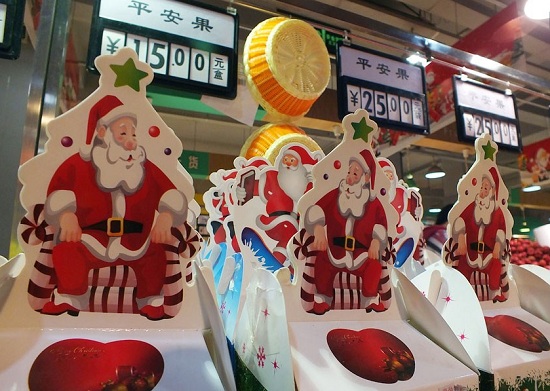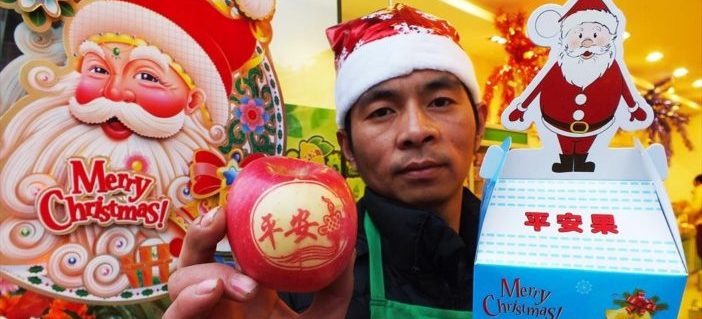First of all, our team at beijingkids wishes you a wonderful Christmas!
You might be celebrating now, but our task of learning Chinese doesn’t stop just yet. In our recent feature article, we listed some words to know this holiday. If you’ve missed them, here’s the vocab list:
– 圣诞节 (Shèngdànjié), “Christmas”
– 圣诞快乐 (Shèngdàn kuàile), “Happy Christmas”
– 圣诞老人 (Shèngdàn laoren), “Old Christmas Man” or, you know him, Santa Claus
– 圣诞树 (Shèngdàn shù), “Christmas tree”
– 叮叮当 (ding ding dāng), “Jingle Bells.”
Though Christmas in China is viewed as a commercialized western holiday rather than a Christian festival, there are still local traditions that link the celebration to its religious roots. You might have seen people handing out apples on Christmas Eve and wondered why. This tradition comes from homophones of the character 平 (píng). Christmas Eve is called 平安夜 (ping’an ye, “quiet/peaceful evening”), and this phrase is translated from the popular carol, “Silent Night.” The same pronunciation of píng occurs in the Chinese words for “peace,” 和平 (hépíng) and “apple” 苹果 (píngguǒ).

The price of apples gets expensive especially during the week before Christmas.
Besides the clever word game, the link between the apple and Christmas might not be a fully Chinese tradition in the first place. There have been mentions of this in religious literature and western customs.
In the 18th century, a poem called “Jesus Christ the Apple Tree” was written by an unknown author. The poem has been adapted into a hymn, then later on into a carol (see this YouTube video, if you’re not familiar with this carol — VPN needed). The “apple” in the poem is seen to be a metaphor that represents Jesus Christ as the tree of life.
There’s also a tradition in Germany in which a polished red apple is hidden among the Christmas tree branches. This apple is called Paradiesapfel (Paradise Apple), and is said to bring anyone who sees it nearer to paradise. Christians believe that Jesus Christ will lead everyone to paradise.
Let’s go back to the Chinese phrase for Christmas, – 圣诞节 Shèngdànjié. While this Chinese phrase doesn’t specifically mention Christianity, the characters 圣诞 relate to the idea behind the religious celebration: 圣 shèng means “holy,” “sacred,” or “saint;” 诞 dàn means “birth;” and 节 jié is “festival.” From them, we get “Sacred Birth Festival” or “Saint’s Birth Festival” literally.
Photos: GB Times, China Whisper




